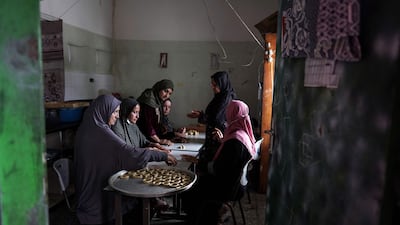Live updates: Follow the latest on Israel-Gaza
In peacetime, Gaza streets are bustling during Eid Al Fitr, thrumming with the sound of Takbirat Eid as people prepare for Eid Iftar.
This year, there will be none of those traditions. In the ruins of Gaza city, the much loved Al Remal and Al Saha markets used to be filled with crowds of people purchasing new clothes for their children, as well as chocolates and Eid sweets.
Today, the two markets are completely devastated, with streets closed and shutters on any shops still standing.
Nobody is there to buy, because few venture from their homes, except for the dangerous task of seeking out aid deliveries, amid a continuing hunger crisis.

“Eid is all about children, and Gaza has lost more than 5,000 of its children. How can we celebrate Eid? Even if the Israeli soldiers were to withdraw from the city, our hearts are filled with sorrow and despair,” 50-year-old Mona Yousef told The National.
Ms Yousef has been staying at a friend's house in Gaza city's Al Nasser neighbourhood since her home in Tal Al Hawa, southern Gaza, was destroyed.
“I feel like my grandson, who should be 10 years old, is already 15. He asked me if children in other Arab countries feel the same way we do,” she added.
“There is sadness and despair evident on the faces of the people, and they are silent most of the time,” she continued.
Mohammed Aziz, 10, has been staying with his married sister in one of the UN-run schools in Jabalia, northern Gaza, since losing his parents and one of his brothers. The small town – mainly a refugee camp – has been heavily bombed by Israel, causing massive casualties.
“Most of the children around me have their parents, and I miss my father and mother. My mother used to take me to buy new clothes for Eid, but now there is no Eid,” Mohammed told The National.
During the first month of the war, Mohammed went to buy potatoes for his mother when their home was destroyed and his parents and brother killed in an Israeli air strike.
His sister is trying to fill the void left by their mother, but is struggling because she also misses their family in these difficult moments.
Hanneen Hinawi, 35, displaced from Gaza city and now living in a tent in Rafah, Gaza's southernmost city, said her children understand that they are experiencing challenging times and that there will not be an Eid celebration in the enclave this year.

“I bought Eid kaek biscuits for them, because they love it and wanted to eat it on the first day after Ramadan, as they always do,” Ms Hinawi told The National.
“Eid is about family gatherings, children playing in the park, giving them money, and buying toys, but they have deprived us of these basics.”
Ms Hinawi, who is staying in a tent with her husband and two children, is separated from her family, and her children have not seen their cousins for six months.
She said all they want is to gather with their friends and relatives in Gaza.
“Our spirits are weary, and we can no longer bear this situation. We used to fully enjoy all the festive occasions, but now all we can focus on is continuing to live our lives.”
Umm Hassan Al Massri, 65, insists on cooking somakia and distributing it to her neighbours in Deir Al Balah, central Gaza.
Somakia is a traditional food that Gazans typically cook on the last day of Ramadan and eat on the first day of Eid.
“I used to cook somakia every Eid, and I will continue to do so, but without meat because meat is now too expensive,” Ms Al Massri told The National.
About 20 members of her family are staying at her home, having been forced to flee from other parts of Gaza.
“This is not the first time we will not celebrate Eid. We are used to this situation, we have lost the joy. Each household and family has lost something in this war,” Ms Al Massri said.
“Even when the war ends, our lives will not return to how they were before.”


